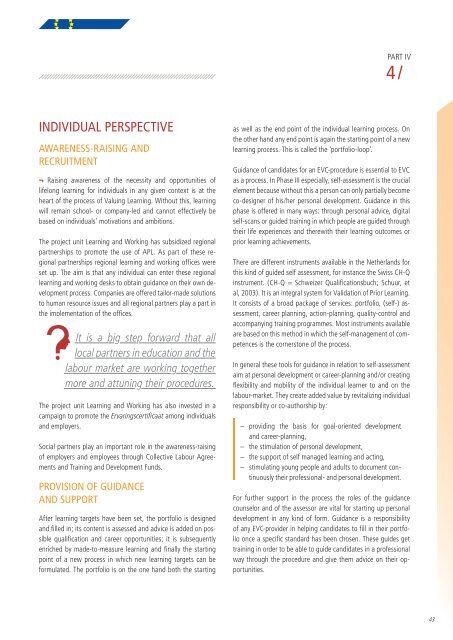RECOGNITION OF NON-FORMAL AND INFORMAL ... - Solidar
RECOGNITION OF NON-FORMAL AND INFORMAL ... - Solidar
RECOGNITION OF NON-FORMAL AND INFORMAL ... - Solidar
Create successful ePaper yourself
Turn your PDF publications into a flip-book with our unique Google optimized e-Paper software.
PART IV<br />
4 /<br />
INDIVIDUAL PERSPECTIVE<br />
AWARENESS-RAISING <strong>AND</strong><br />
RECRUITMENT<br />
¬ Raising awareness of the necessity and opportunities of<br />
lifelong learning for individuals in any given context is at the<br />
heart of the process of Valuing Learning. Without this, learning<br />
will remain school- or company-led and cannot effectively be<br />
based on individuals’ motivations and ambitions.<br />
The project unit Learning and Working has subsidized regional<br />
partnerships to promote the use of APL. As part of these regional<br />
partnerships regional learning and working offi ces were<br />
set up. The aim is that any individual can enter these regional<br />
learning and working desks to obtain guidance on their own development<br />
process. Companies are offered tailor-made solutions<br />
to human resource issues and all regional partners play a part in<br />
the implementation of the offi ces.<br />
It is a big step forward that all<br />
local partners in education and the<br />
labour market are working together<br />
more and attuning their procedures.<br />
The project unit Learning and Working has also invested in a<br />
campaign to promote the Ervaringscertifi caat among individuals<br />
and employers.<br />
Social partners play an important role in the awareness-raising<br />
of employers and employees through Collective Labour Agreements<br />
and Training and Development Funds.<br />
PROVISION <strong>OF</strong> GUIDANCE<br />
<strong>AND</strong> SUPPORT<br />
After learning targets have been set, the portfolio is designed<br />
and fi lled in; its content is assessed and advice is added on possible<br />
qualifi cation and career opportunities; it is subsequently<br />
enriched by made-to-measure learning and fi nally the starting<br />
point of a new process in which new learning targets can be<br />
formulated. The portfolio is on the one hand both the starting<br />
as well as the end point of the individual learning process. On<br />
the other hand any end point is again the starting point of a new<br />
learning process. This is called the ‘portfolio-loop’.<br />
Guidance of candidates for an EVC-procedure is essential to EVC<br />
as a process. In Phase III especially, self-assessment is the crucial<br />
element because without this a person can only partially become<br />
co-designer of his/her personal development. Guidance in this<br />
phase is offered in many ways: through personal advice, digital<br />
self-scans or guided training in which people are guided through<br />
their life experiences and therewith their learning outcomes or<br />
prior learning achievements.<br />
There are different instruments available in the Netherlands for<br />
this kind of guided self assessment, for instance the Swiss CH-Q<br />
instrument. (CH-Q = Schweizer Qualifi cationsbuch; Schuur, et<br />
al, 2003). It is an integral system for Validation of Prior Learning.<br />
It consists of a broad package of services: portfolio, (self-) assessment,<br />
career planning, action-planning, quality-control and<br />
accompanying training programmes. Most instruments available<br />
are based on this method in which the self-management of competences<br />
is the cornerstone of the process.<br />
In general these tools for guidance in relation to self-assessment<br />
aim at personal development or career-planning and/or creating<br />
fl exibility and mobility of the individual learner to and on the<br />
labour-market. They create added value by revitalizing individual<br />
responsibility or co-authorship by:<br />
– providing the basis for goal-oriented development<br />
and career-planning,<br />
– the stimulation of personal development,<br />
– the support of self managed learning and acting,<br />
– stimulating young people and adults to document continuously<br />
their professional- and personal development.<br />
For further support in the process the roles of the guidance<br />
counselor and of the assessor are vital for starting up personal<br />
development in any kind of form. Guidance is a responsibility<br />
of any EVC-provider in helping candidates to fi ll in their portfolio<br />
once a specifi c standard has been chosen. These guides get<br />
training in order to be able to guide candidates in a professional<br />
way through the procedure and give them advice on their opportunities.<br />
43
















